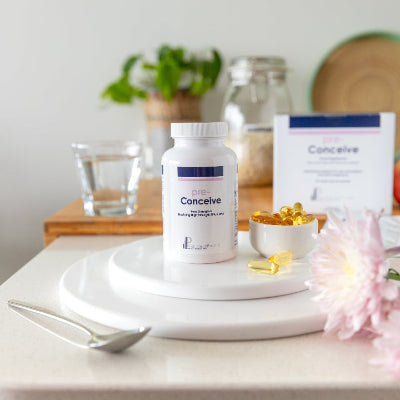If you’re preparing for IVF (In Vitro Fertilisation) or IUI (Intrauterine Insemination), you’ve likely discovered that fertility involves more than just timing and technology, it’s about creating the healthiest possible environment for conception.
This is where pre-Conceive plays a powerful role. Designed to support reproductive wellness at a cellular level, pre-Conceive provides the essential nutrients and antioxidants your body needs to optimise egg and sperm quality, improve energy metabolism, and enhance your chances of success, naturally.
Let’s explore how science supports this approach and why pre-Conceive can be a valuable ally in your fertility journey.
The Science of Nutrient Preparation in Assisted Conception
Before IVF or IUI, both eggs and sperm go through maturation processes that last several weeks to months. During this time, nutritional and environmental factors can directly influence their health.
For example:
- Eggs mature over ~90 days before ovulation.
- Sperm take about 74 to 90 days to develop fully.
This means the three months leading up to IVF or IUI are critical for nutritional optimisation. pre-Conceive was designed specifically for this window, to strengthen reproductive cells, reduce oxidative stress, and enhance mitochondrial energy (the power source of every cell).
How Pre-Conceive Works
pre-Conceive combines antioxidants, vitamins, minerals, and amino acids, as well as Omega-3 clinically shown to support reproductive function in both men and women. Let’s break down how these ingredients work synergistically to enhance fertility outcomes.
Enhances Egg and Sperm Quality
Oxidative stress, caused by pollution, poor diet, and ageing, can damage DNA in reproductive cells.
- Antioxidants like CoQ10, vitamins C and E, and selenium in pre-Conceive protect egg and sperm DNA, improving cell integrity and reducing fragmentation.
- Healthier eggs and sperm translate into higher-quality embryos, which is essential for IVF and IUI success.
Supports Mitochondrial Function
The mitochondria generate the energy needed for fertilisation and early embryo development.
- Coenzyme Q10, L-Carnitine, and Alpha-Lipoic Acid fuel these energy factories, enhancing egg maturation and sperm motility.
- Studies show improved mitochondrial function correlates with better fertilisation rates and embryo viability.
Optimises Hormone Balance and Ovulation
pre-Conceive includes B vitamins (B6, B12, folate) and minerals like zinc and magnesium, which play vital roles in hormone synthesis and regulation.
- Balanced hormones support regular ovulation and improve the responsiveness of the ovaries during IVF stimulation cycles.
- For men, these nutrients also support testosterone production and sperm formation.
Improves Endometrial and Seminal Environment
- Nutrients like vitamin D, omega-3s, and antioxidants promote a healthy uterine lining, improving implantation potential.
- For men, they enhance seminal plasma antioxidant capacity, protecting sperm during fertilisation and IUI preparation.
Evidence-Based Nutrient Benefits in Fertility
Scientific research supports the key nutrients found in pre-Conceive, each playing a specific role in supporting reproductive health. CoQ10 helps improve mitochondrial energy production in eggs and supports sperm motility, while L-Carnitine enhances sperm movement and concentration. Folate and vitamin B12 work together to promote healthy DNA synthesis and reduce chromosomal irregularities, and the combination of zinc and selenium is vital for sperm structure, ovulation, and embryo quality. Vitamin D contributes to hormonal balance and endometrial receptivity, further supporting successful conception. Together, these nutrients help create an optimal metabolic and antioxidant environment for reproductive wellness.
pre-Conceive and Assisted Reproduction: A Perfect Partnership
Whether preparing for IVF or IUI, nutrition influences nearly every stage of the assisted conception process. During ovarian stimulation, nutrients such as B-vitamins, zinc, and CoQ10 support hormone regulation and follicle growth. Antioxidants like vitamins C and E and selenium help protect egg DNA during retrieval, while L-Carnitine and zinc aid fertilisation by improving egg–sperm interaction. In embryo development, CoQ10 and alpha-lipoic acid enhance mitochondrial energy and cell division, and vitamin D with omega-3 fatty acids promotes endometrial receptivity to support implantation. This holistic, systems-based nutritional approach makes pre-Conceive a valuable, science-driven companion for individuals undergoing assisted reproduction.
Lifestyle Synergy: Maximising pre-Conceive Benefits
To get the most from your pre-Conceive plan, combine supplementation with lifestyle habits that further promote fertility:
- Eat a Mediterranean-style diet rich in plants, lean protein, and healthy fats.
- Sleep 7 to 8 hours per night to regulate reproductive hormones.
- Exercise moderately, avoiding extreme endurance activity.
- Minimise toxin exposure (tobacco, alcohol, BPA, pesticides).
- Manage stress through mindfulness, yoga, or breathing exercises.
Consistency matters; nutrient stores take time to build, so most clinicians recommend beginning pre-Conceive at least 3 months before your IVF or IUI cycle.
Conclusion
Whether you’re pursuing IVF or IUI, your fertility journey can benefit immensely from targeted nutritional support. pre-Conceive helps nourish your reproductive system at the cellular level, enhancing egg and sperm health, hormone balance, and implantation potential, naturally.
By combining modern reproductive medicine with evidence-based nutritional science, you give yourself the best possible foundation for conception and a healthy pregnancy.






